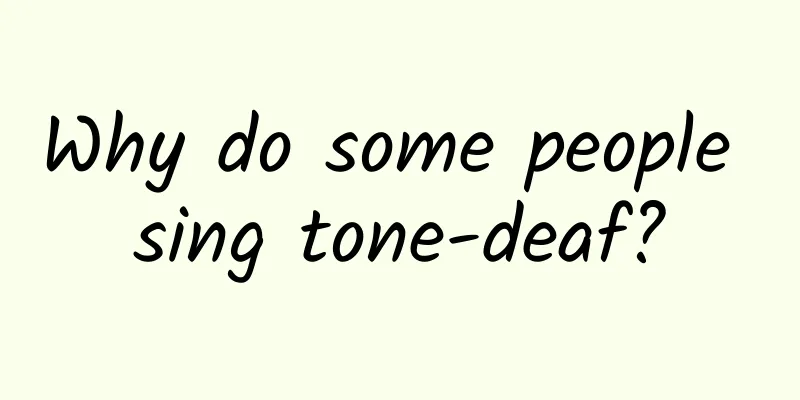Why do some people sing tone-deaf?

|
Recently, I often hear my colleague (finally online) telling stories about her friends. For example, one friend gets fat just by drinking water, another friend is very cute but has no partner, and another friend... I often wonder if the friend she is talking about is actually herself. Today, she shared with me another true story about one of her friends. When I was in college, if I wanted to go out late at night, my first choice was usually to go to KTV to sing. The friend I’m going to talk about next has a singing voice that is so earth-shattering and soul-stirring. It all started with his song "Qilixiang" by Jay Chou that summer. As soon as he opened his mouth, I felt that all the sparrows in the lyrics flew away . Not a single word of the 406 words in the song was in tune. If it weren't for the lyrics and the MV in front of me, I would have never known that the song he sang was by Jay Chou. What's more fatal is that the melody he sang has such a strong aftertaste that the first melody that pops into my mind when I listen to "Seven Miles of Fragrance" is the one he developed. Everyone knows that singing a song beautifully is a skill, but singing a "new version" of a song is not an easy task. As luck would have it, very few people (about 4% of the world's population) are born with this "talent". But don't be jealous, because this "talent" actually comes from a congenital disease - amusia . Normal people who grow up under normal social conditions generally have certain musical cognitive abilities, such as being able to identify pitch ("do", "mi", "so"), grasp rhythm ("dong, dongdong, dongdongdong"), and recognize melody (sounds of different pitches appear regularly according to rhythm). But patients with congenital amusia have lost their normal cognitive function of music , and they cannot sing songs accurately. Just like patients who cannot recognize rhythm, they cannot hear the rhythm in the song, which is what we commonly call "stuck points". But what’s interesting is that without music, they can dance square dances and do radio gymnastics normally, and even shout labor songs and swing sledgehammers, but they just can’t dance to the music. At present, the research on this symptom is mainly concentrated in the field of cognitive neuropsychology . Clinical studies on many patients with amusia have shown that when the human brain processes music information, all cortical areas are basically involved. Of course, the auditory cortex is the leader , and other motor cortices, limbic cortexes and cerebellum will also help from time to time. When encountering more complex situations, such as requiring you to remember words or invest your emotions, the neural pathways and brain structures related to memory or emotion are involved. Abnormalities in these tissues may lead to amusia. For example, in the right hemisphere of our brain, there is a structure called the inferior frontal gyrus (IFG) . In amusia patients, the white matter here is less than that of normal people, and the cortex is thicker , which leads to the maldevelopment of the neural circuits related to music. d indicates right inferior frontal gyrus In addition, not only are patients unable to identify pitch and perceive melody , but even daily language communication may not be able to proceed normally due to the inability to recognize tones, so this symptom often occurs simultaneously with aphasia. In addition to the force majeure factors mentioned above, there are still many "contestants" in life who cannot sing in tune. Apart from the temporary excuse of "uncomfortable throat", it is possible that they have weak "voice conversion ability". I don’t know if there are still some friends who read paper books or like to read on electronic devices. When we read a long paragraph, our mouths will unconsciously read silently, thus forming an "auditory image" in our minds . The same goes for singing. Researchers from the University of Buffalo conducted an experiment in which they invited 46 volunteers with no musical experience and gave them enough time to listen to a song. Afterwards, the researchers asked them to repeat a melody from the song they had just heard. The result was that only about one-third of the people could sing it accurately. The reason is that before singing, the brain of these people will input the "auditory image" of the previous song, and when singing, they only need to output this image, including tone, pitch, rhythm and other information. (Although it seems to be related to short-term memory, it is not very related) It is difficult for people without "auditory images" to sing the correct melody. You can understand it this way, it is equivalent to having a "Siri" (voice assistant) built into our brain. When you ask her a question, if she knows the answer, she will answer you; if she doesn't know... But things are not that simple. I believe that many people have simulated the singing in their minds several times when listening to other people singing, as if Jay Chou ran into my head and held a private concert, and then I had the bold idea that I could do it too. But as soon as she took the microphone and opened her mouth, it was as if she had turned on a voice changer, and her voice changed from a loli voice to a duck voice, which was very different from the voice in her mind. In fact, in addition to having the material in your brain, the muscles around your throat and lips also need to cooperate. Another study used functional magnetic resonance imaging to measure the activity of specific muscles while people sang, and found that only the larynx and lips produced significant activity. In addition, for people who sang in tune, the imaging showed that their throat muscle activity was not strong. On the contrary, the muscle activity of people who always sang out of tune was more prominent. This also illustrates a problem. Please don't shout into the microphone until your throat is hoarse when singing next time, okay!!! Finally, I will teach you how to improve your tone-deafness. More practice is definitely necessary, for example, you can invite a few friends to KTV to relax from time to time, start to cultivate sight-singing ability from simple and familiar music , and find a muscle activity method that suits you, which can significantly improve the problem of "out-of-tune" singing. It may be a bit time-consuming for friends... How is it? Miss, no, did your friends learn it? ps: As for patients with ahedonia, we have to say that they are the real angels with broken wings. If you have such friends around you, please give them more care. |
>>: Will eating too much sugar make you age faster? 3 tips to avoid the harm of "high sugar"!
Recommend
Shadow video live streaming
Introduction to the live streaming resources of S...
WeChat Development Access Guide
Overview To access the WeChat public platform for...
A First Look at Apple WatchKit
With Apple releasing the latest version of Watch ...
Is your iPhone lagging more and more? Turn off these 3 default settings and your phone will run smoother
1. Turn off automatic system updates [[398263]] S...
Gu Mu's resume: The difference between black hat and white hat techniques in SEO optimization
As the name suggests, white hat SEO optimization ...
Category Marketing Script Framework for Live Broadcast Rooms
1. The core logic of marketing tactics The core l...
Will Apple launch MFi certification for the iPhone's Type-C port? Maybe it's not a bad thing
At present, except for some models with extremely...
How to develop the financial accounting applet in Zhongshan and how to make the financial diary applet?
With the economic downturn, many people have begu...
Healing brand advertising becomes mainstream!
To be honest, in recent years, under the pressure...
If you have polyps, how far are you from cancer?
Expert of this article: Hu Zhongdong, chief physi...
The Autumnal Equinox is here. Do a good job of "four preventions" and "three no leaks" to have a good autumn.
The Autumnal Equinox has arrived, indicating that...
When will the lunar research station be built? When will the Chinese land on the moon? Revealed →
On November 21, the United Nations/China Space Ex...
How to move a sofa around a corridor? This is a problem that has puzzled mathematicians for more than 60 years.
It is probably too early to assert that the "...
In the bitter winter, why is it Xiaomi that helps Xiaopeng Electric Vehicles survive?
New energy vehicles are an inevitable future, but...
Mysterious respiratory disease is spreading among American dogs; eating nuts can improve men's sperm quality | Technology Weekly
Compiled by Zhou Shuyi Mysterious respiratory dis...









